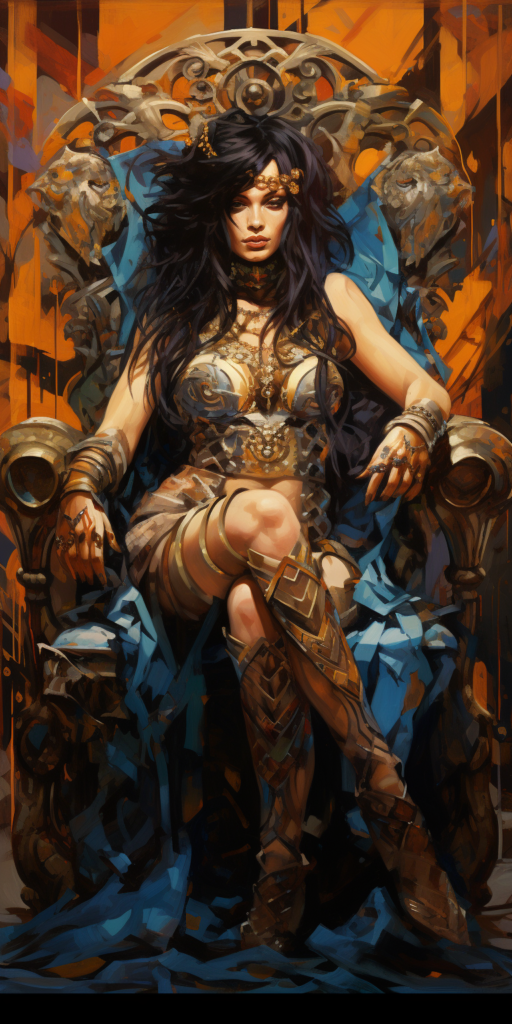“Chieftain of the Tribal Vanguard”
“Lead Your Tribe to Glory as a Chieftain!”

Somebody has to be in charge.
Dynasties and Demagogues
Author Chris Aylott
Series Campaign Style Series
Publisher Atlas Games
Publish date 2003
In a small tribe or village, power usually rests in the hands of one person. She may be advised by a shaman or the village elders, but it’s her responsibility to make the big decisions. Chieftains also rule larger societies that prize martial prowess and an intimidating demeanor. Many kings have a few levels of the chieftain prestige class, though they usually develop other talents as well.
There are many ways of picking a chieftain. Some inherit power the son or daughter of a chieftain may be trained from birth to take over the tribe. Others win power by being the best hunter, or the best war-leader. Trial by combat is not unusual, but many villages devise other contests. Prospective chieftains might have to lead a hunt for a large animal, or win a victory over a rival tribe, or even spin the best tale in the longhouse. Other chieftains are elected by vote or acclamation. The giving of gifts is frequently important a chief who can give rich gifts shows that she has the fighting ability to win treasure and the generosity to share.
Despite the importance of previous achievements to gaining the position, most chieftains do less of what they’re best at once they become chief. Their job is about inspiring and teaching their followers. They resolve disputes and make decisions for the tribe. Many chieftains dislike doing most of their work from a feasting chair, and leap at any opportunity to lead their followers on a big game hunt or a daring raid.
Many chieftains start off as barbarians, bards, or rogues.
Hit Die: d8
Requirements
To qualify for the chieftain prestige class, the character must fulfill the following criteria.
Alignment: Any non-chaotic
Base Attack Bonus: +6
Skills: Diplomacy 9 ranks or Intimidate 9 ranks, and Sense Motive 6 ranks
Feats: Leadership
Special: The character must take control of a tribe or village before gaining her first level as a chieftain. This may involve trial by combat, inheritance, divine intervention, or whatever other method the customs of that society dictate.
Class Skills
The chieftain’s class skills (and the key ability for each skill) are Bluff (Charisma), Climb (Strength), Craft (Intelligence), Diplomacy (Charisma), Intimidate (Charisma), Jump (Strength), Ride (Dexterity), Sense Motive (Wisdom), Swim (Strength), and Wilderness Lore (Wisdom).
Skill Points at Each Level: 4 + Intelligence modifier
| Level | Base Attack Bonus | Fort Save | Ref Save | Will Save | Special |
| 1 | +0 | +0 | +0 | +2 | Authority +2, Followers |
| 2 | +1 | +0 | +0 | +3 | Commanding Voice |
| 3 | +2 | +1 | +1 | +3 | Bonus Feat |
| 4 | +3 | +1 | +1 | +4 | Raise Horde (100 warriors) |
| 5 | +3 | +1 | +1 | +4 | Authority +4 |
| 6 | +4 | +2 | +2 | +5 | Fearsome Reputation +2 |
| 7 | +5 | +2 | +2 | +5 | Bonus Feat |
| 8 | +6 | +2 | +2 | +6 | Raise Horde (1000 warriors) |
| 9 | +6 | +3 | +3 | +6 | Authority +6 |
| 10 | +7 | +3 | +3 | +7 | Fearsome Reputation +4, Raise Horde (unlimited) |
Class Features
All the following are class features for the chieftain prestige class.
Weapon and Armor Proficiency: The chieftain is proficient in all simple weapons and martial weapons, all armor, and shields.
Followers: A chieftain receives a +2 modifier to her Leadership score for recruiting cohorts and followers. Any PC may also declare himself to be a follower of the chieftain. In addition, all 1st-level commoners who are members of the chieftain’s tribe or village are considered to be followers, but do not count against the limits set by the Leadership feat.
Authority: The chieftain benefits from the authority invested in her as leader of her tribe. She receives a +2 influence bonus to Bluff, Diplomacy, Perform (oratory), and Intimidate checks to influence her followers. The bonus increases to +4 at 5th level, and +6 at 9th level.
Commanding Voice: At 2nd level, the chieftain gains the Commanding Voice feat, even if she does not meet the prerequisites.
Bonus Feat: At 3rd and 7th level, the chieftain gains a bonus feat from the following list: Alertness, Dangerous Insinuations, Inspire Frenzy, Inspired Leader, Iron Will, Mounted Combat, Rabble Rouser, Sweet Voice of Reason, or Toughness.
Raise Horde: At 4th level, the chieftain may raise a horde of up to 100 1st-level warriors to accomplish a military objective. The chieftain may raise the horde no more than twice per game year, and the horde will serve for no more than one month of game time. The horde’s size is also limited by the size of the chieftain’s tribe. There can be no more than half as many warriors as the chieftain’s total number of followers.
At 8th level, the maximum size of the horde increases to 1000 1st-level warriors. At 10th level, there is no limit on the maximum size of the horde. However, the horde is still limited to half as many warriors as the chieftain’s total number of followers. Mighty hordes must be supported by mighty empires.
Fearsome Reputation: At 5th level, the chieftain’s reputation spreads far and wide. The chieftain receives a +2 influence bonus to Bluff, Diplomacy, Perform (oratory), and Intimidate checks when her identity is known. At 10th level, the chieftain’s bonus increases to +4. Any follower of the chieftain receives a +2 influence bonus to Bluff, Diplomacy, and Intimidate checks when he is known to be on the chieftain’s business.

 Buy me a coffee
Buy me a coffee